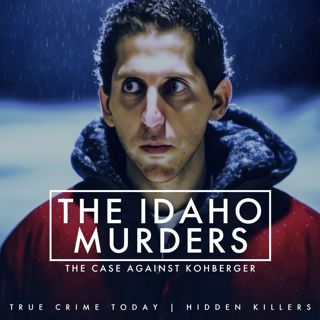
Defense Attorney Bob Motta Breaks Down DNA Arguments in Kohberger Case
Om avsnittet
Defense Attorney Bob Motta Breaks Down DNA Arguments in Kohberger Case In a recent episode of the "Hidden Killers" podcast, Tony Brueski delved deep into the ongoing case of Brian Kohberger. The discussion, featuring Defense Attorney Bob Motta of "Defense Diaries," shed light on the complexities surrounding the use of new DNA evidence techniques in court. At the heart of the matter lies the speedy trial wave, which seems to have been used by Anne Taylor, defense attorney for Kohberger, to buy more time for a closer examination of evidence. One point of contention is the availability of certain evidence, particularly data and research related to IgG, which the state argues is not subject to Rule 17 and is therefore non-discoverable. "Everything that we've been hearing about with the IgG and all that data and the research that she wants, and the state is, you know, claiming, look, it doesn't fall under Rule 17 and we don't have to give it to you," Brueski mentioned. According to Motta, if Taylor files a motion to suppress based on the IgG information, it is likely to be denied due to the third-party nature of the information source. He explains that traditionally, DNA profiles submitted either to public databases or private ones, such as Ancestry or 23andMe, have required a legal warrant for law enforcement access. However, some people opt to upload their profiles to databases like GEDMatch, which law enforcement can access without a warrant. Motta points out that this new realm of forensic science presents a unique challenge as the courts grapple with its implications. He said, "This is so brand new that it hasn't been vetted yet." The issue is rooted in the sharing of the Y STR DNA strand, which can be common to every male in a family lineage. Motta elaborated, "Because of the fact that you share that same Y STR DNA strand with everybody in your familial line, all the way to males in your family line to your great-great-great grandfather... the argument is, do does a defendant who they're not searching him... have standing to say, okay, you needed a warrant to get into that database, searching for essentially my DNA." He emphasizes the unparalleled nature of this technology, drawing a distinction between voluntarily shared data, such as text messages, and the involuntarily shared genetic markers of distant relatives. "There is nothing voluntary about your distant relatives sharing your DNA. That's just a fact," he affirmed. There's no doubt that this DNA technology presents law enforcement with a potent tool. But as Motta highlights, while there's immense potential for good, there are also questions about civil rights and liberties. The crux of the matter is the need for a warrant to access such data. This is not about discontinuing its use, but ensuring that it's accessed lawfully. "Use it, but you have to get a warrant just like you do for anything else," he noted. As the debate continues, Motta doesn't seem optimistic about Taylor's chances with her motion to suppress based on current legal interpretations. "He'll lose it. But that's how you get to the appellate court," he stated. Already, states like Maryland have legislated on this issue, but any law is open to interpretation and litigation. As Motta poignantly summed it up, "The whole thing is about interpretation. You have the state interpreting it one way and you have the defense interpreting another way. And then you leave it to a judge to decide." It remains to be seen how the courts will navigate this new terrain, but one thing is clear: the landscape of forensic science and the law is undergoing a transformation, one case at a time. Want to listen to ALL of our podcasts AD-FREE? Subscribe through APPLE PODCASTS, and try it for three days free: https://tinyurl.com/ycw626tj Follow Our Other Cases: https://www.truecrimetodaypod.com The latest on Catching the Long Island Serial Killer, Chad & Lori Daybell, The Murder of Ana Walshe, Alex Murdaugh, Bryan Kohberger, Lucy Letby, Kouri Richins, Justice for Harmony Montgomery, The Murder of Stephen Smith, The Murder of Madeline Kingsbury, and much more! Listen at https://www.truecrimetodaypod.com
